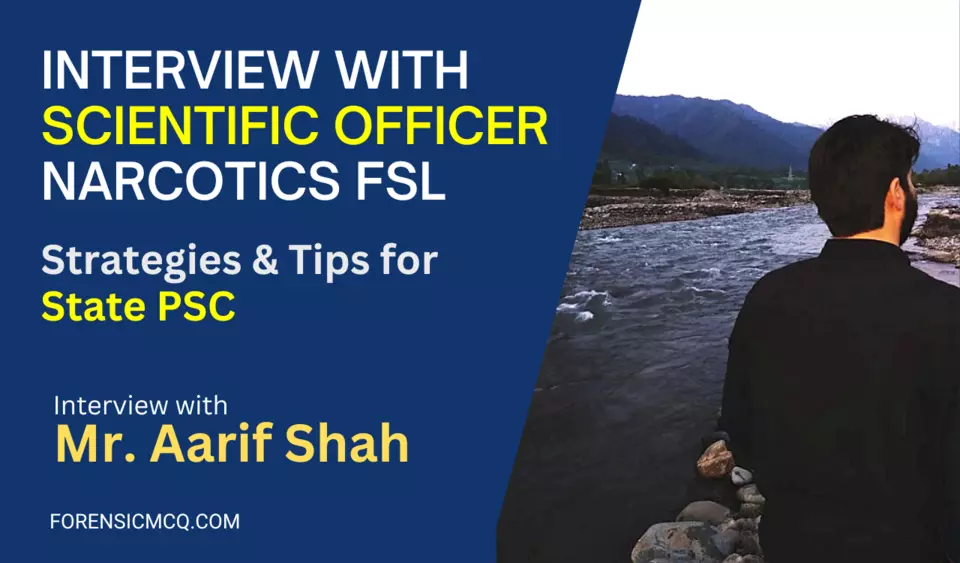
Disclaimer: The following are the thoughts of Dr. Aarif Shah, and ForensicMCQ.com didn’t give him any sort of award or promise of money for writing it. All thoughts are personal reflections from Mr. Aarif.
Tell us About Yourself
I am Dr. Aarif Shah from Srinagar, J&K.
I have completed my Master’s degree in Biochemistry from the University of Kashmir. I have qualified for various exams like CSIR-UGC NET, SET, DST, etc. I have also done a forensic science course from Nanyang Technological University (NTU, 11th Global Rank), and my doctoral program involved research on drugs.
I recently qualified for the Scientific Officer, Narcotics post (JKFSL). 68 applicants competed for this single post, and 5 were shortlisted for the interview round based on their performance in the written exam.
The interview was held nearly 6 months after the declaration of the written test results, and the final selection list was released a week after the interview.
What initially sparked your interest in forensic science?
During my PG program, I have studied about drugs, how they affect the nervous system, their detoxification mechanism, etc. This was sufficient to spark interest in the forensic science area.
When did you learn about the state PSC, and how do you get updates?
I got to know about the exam from the PSC (Public Service Commission) notification. JKPSC is the agency that conducts exams for the recruitment of gazetted posts.
What are the minimum educational qualifications needed for this exam?
The minimum qualification required for the post was a Master’s degree in Chemistry/ Biochemistry/ Toxicology/ Forensic Science with a minimum of 50% marks from any recognized university with at least 2 years working experience in the relevant field.
Can you describe the recruitment process for a forensic scientific officer at the J&K FSL facility?
Applications through online mode are invited from the applicants by PSC for filling up the post of Scientific Officer. The selection process comprises a written exam and Interview/Viva Voce.
The written examination was a 2-hour (120 minutes) MCQ exam having 120 questions. There was a negative marking for incorrect answers. Based on the number of posts, the candidates are shortlisted for the interviews as per the JKPSC Rules.
The applicants should initially devote their full time to thoroughly covering the syllabus for the post.
Since there was a single post, scoring well in the written examination was very important to get far ahead of other applicants so that the interview score wouldn’t matter much.
What are the primary responsibilities and duties of a forensic scientific officer at the J&K facility?
Although I have yet to join the department, I believe the duties and responsibilities of a forensic scientific officer will be the same, whether at CFSL or SFSL.
The responsibilities and duties include examination of cases, giving expert opinions, deposing of evidence before the court of law, providing guidance to Junior scientific staff, etc.
You’re selected as “Scientific Officer, Narcotics” J&K FSL. During the recruitment process, what skills or competencies one should have?
As per the notification, the only additional requirement was 2 years experience of working in the relevant field in the Govt lab or in a lab of Govt undertaking.
I believe if a potential candidate has analytical research experience and working knowledge of advanced/ Category A, B, or C techniques and instruments, it will give them an edge in making a good impression before the Interview board.
There was also an interview part. Can you share your experience with the quality and level of questions?
Uff… The interview day was a hectic one.
Just imagine the level of pressure on candidates when there is only a single post in each section.
That was a pressure cooker situation.
There were around 8 members on the interview board. Experts were heads intellectuals of reputed forensic institutes invited from different states of the country (The expert panel is known to PSC only).
The interview questions were related to the nature of the post and mainly focused on testing the knowledge and suitability of the candidate for the designated post.
The questions that were asked covered the in-depth knowledge of the candidate, technicalities, analysis, and current happenings in the field.
The expert members were knowledgeable and sober at the same time. I enjoyed my session before the interview board.
Can you walk us through a typical day when you’re preparing for the exam?
I kept it simple but constant. Study for 2 hours in the morning and 2-3 hours in the evening. I again repeat, “Smart work and perseverance” is the mantra for success.
What are some of the challenges you face while preparing for the post, and how do you overcome them?
The biggest challenge I faced while preparing for the post was the lack of quality study material. While searching for the study material online, I came across your website.
After having a look at your content, my search stopped. I then used the website to fully polish my preparation.
I was in touch with your experts, who always guided me whenever I faced any issues with the preparation.
What books and online resources have you followed in your preparation?
I followed the books that covered the syllabus for the written examination. In addition to that, I regularly studied from the ForensicMCQ.com website and also got the necessary guidance from their team.
Discuss your experience with ForensicMCQ.com as a Premium Member.
The experience with ForensicMCQ.com has been phenomenal. I found premium membership very helpful.
Would you recommend ForensicMCQ.com to other aspirants preparing for State PSC exams?
Absolutely…It is an essential tool that will boost one’s preparation to a great extent. Aspirants should benefit from this platform.
Preparing for the interview is different from a written (mcqs) exam. How did you prepare for the interview? Share some tactics and tips.
I focused on the applied part for the interviews.
Since the syllabus for the written exam was voluminous, I zeroed in on the analytical and testing parts.
In addition to this, I also thoroughly went through the basics of forensic science.
I had a clear plan in my mind regarding how to present myself as the best suitable candidate for the job.
And by the grace of God, prayers of parents, and well-wishers, I made it to the top.
Preparing for such a PSC post is intense, demanding, and stressful. How do you maintain a healthy work-life balance?
I didn’t study for more than 4-5 hours per day. I used to go for walking and cycling to stay away from stress.
How do you manage stress while preparing for the interview? How did you calm yourself on the day of the interview and when you sat on the chair as an interviewee?
There was a gap of 3-4 months between the declaration of written results and the interview. This was enough time to polish my knowledge and gain self-confidence. Once you’re well prepared, it reflects in your body language.
You’re one of five finalists for the post. What do you think helps you most to get that one seat that you were aiming for?
I believe that smart work and perseverance are the most important factors for qualifying for these exams.
For someone aspiring to become a forensic scientific officer, what advice would you give regarding preparation and mindset?
I would advise them to remain focused and prepare well. Give your best shot and the rest of the things will fall in place.
Read More Interview: Interview With Forensic Scholars
